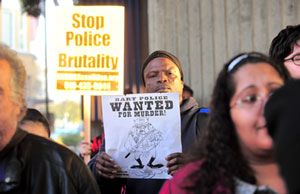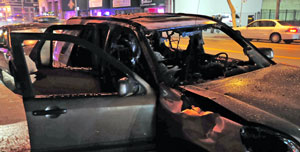CHARLENEM
Anger, sorrow in Oakland over stunning shooting captured by cell phone cams

OAKLAND (FinalCall.com) – Many people in the Bay Area knew Oscar Grant, III, as a good son, a good father, and a good Christian, who worked two jobs and made time for others. The 22-year-old died powerless on New Year’s Day, with a knee on his back, begging for his life as Johannes Mehserle, a then-Bay Area Rapid Transit (BART) police officer, shot him at close range.
Cell phones allowed several witnesses to capture the shooting on video and post the scenes to YouTube on the internet, where thousands have viewed the footage. National TV news programs also broadcast the YouTube video, which has added to pressure and increased awareness of the horrific shooting.
“This is the worst because he was laying on the ground on his stomach. He’d put his hands behind him in a compliant position. He was not being aggressive. He did not have a weapon and the officer, for reasons that made no sense, pulled out a gun and shot him in the back,” civil rights attorney John Burris told The Final Call.

Mr. Grant’s young daughter is in constant disbelief and wants to go to heaven to be with her daddy and all of the family members are stuck in depths of sadness and pain, Atty. Burris said.
That includes childhood friends who were with Mr. Grant that early morning. According to Atty. Burris, they are emotionally traumatized, some to the point where they can’t talk and need medical assistance. Some were held in handcuffs, put in police cars and taken to jail and held for five hours for no crimes.
The shooting has sparked a series of events, including demands to recall Alameda County District Attorney Tom Orloff; a $25 million civil claim against BART and Mr. Mehserle; Mr. Mehserle’s resignation; and various demonstrations, including a violent rebellion that ensued when Oakland police officers blocked about 200 people from marching through the downtown business district. Violence erupted in clashes between police and demonstrators, arrests were made, cars overturned and set afire and windows smashed at downtown establishments.
The district attorney said Jan. 8 that his investigation should be completed by Jan. 22 and a major demonstration was scheduled Jan. 14 with national figures, according to rally organizers. Attorney General Edmund Jerry Brown assigned a staff member to monitor the DA’s investigation and federal mediators were headed to Oakland at Final Call presstime.
The BART board of directors heard six hours of public testimony Jan. 10. Student Minister Keith Muhammad of Muhammad Mosque No. 26B in Oakland used scripture to underscore his point to BART and the community. “Justice stands afar off and equity cannot enter because truth is laying in the streets,” he said, before calling for the district attorney to prosecute Mr. Mehserle to the fullest extent of the law.
“I don’t want to hear anything about a union right. There are no employee rights to protect an employee from the charge of murder. So if the union says we’re protecting him, then the union should be charged with him. People want to know what went wrong,” he said.
Mayor Ron Dellums, who has been widely criticized with others for not speaking out sooner, told The Final Call that the problem was communication. “I was one of the people, as most of us, who thought that the process was going to go forward–that there was an independent investigation being conducted by Bay Area Rapid Transit and that there was a parallel investigation going on by the District Attorney’s Office,” he said.
“But the practical reality is because people weren’t communicated with in an open, timely and routine fashion, what started to build up in the community was a sense that the process lacked integrity. People lost faith in that process,” the mayor added. Everyone should use the moment to create healing centers for the youth, build partnerships with business owners and engage in a citywide dialogue to move forward, he said.
A slow investigation and a flight risk?
According to Atty. Burris, BART could have demanded that their employee submit to questioning and if he didn’t, they could have fired him, but they waited six days. Linton Johnson, BART spokesperson, said the department actually made several attempts and requests to meet with Mr. Mehserle, but he declined them all.
Atty. Burris wants Mr. Mehserle prosecuted either for second-degree murder or manslaughter, but because he is a private citizen and hasn’t been charged, the attorney and many others feel that he’s a flight risk. The district attorney has said he needs to take two weeks to even decide whether to file criminal charges.
Oakland City Councilmember Desley Brooks, called for 24-hour police surveillance on Mr. Mehserle until he’s arrested. “We need to make sure that this one doesn’t get away,” she said. “We need to put things into place that we make sure we don’t have our children executed on the streets of our city in broad daylight. We need to ensure that we continue a movement forward that makes the changes that we need to see so that we never see this happen again.”
National problem of police shootings
Atty. Burris said that his investigation has revealed that Mr. Mehserle has a history of misconduct. “I even have a case in my office that I wasn’t aware of until I received his name. We are also hearing reports that on the night of the incident, before he got there, he had been overly aggressive and caused someone to go to the hospital,” he said.
Other cases of police violence that occurred around the same time that Mr. Grant was killed also gained national attention. Adolph Grimes, III died on New Year’s Day in New Orleans, after nine undercover narcotics officers surrounded his car. He was shot 14 times, including 12 times in the back, and his family disputes police claims that he fired on the officers. On New Year’s Eve, a White police officer in Bellaire, Texas, shot and killed Paul Tolan, a 23-year-old Black youth, in the driveway of his home. And in Los Angeles, reports recently indicated that the Los Angeles Police Department tried to coerce the coroner to change his report, which found that a S.W.A.T. bullet killed 19-month-old Suzie Pena, who was shot during a police standoff with her father three years ago.
‘Baggy pants’ shootings
“People are infuriated that it happens all the time but now it’s being talked about and being dealt with because it was finally captured on camera,” Eleanor Alderman, a second grade teacher at Acorn Woodland Elementary in East Oakland, told The Final Call.
Two of her students lost siblings to police violence last year and she is fed up. She decided to track the pattern of violence, and like one shooting that happened in front their school, many aren’t captured on camera. Incidents are carefully covered up, and the details and the witnesses’ testimonies are ignored, Ms. Alderman continued. Ms. Alderman is White.
Some of the victims she’s tracked include Casper Banjo, Anita Gay, Gary King, Jr., Jose Luis Buenrostro Gonzalez, III, Andrew Moppin, Andrew Woodfox, all killed within the last two years by Oakland police, she said.
Ms. Alderman said the pattern stems from police officers with previous records of misconduct. Many were transferred to East Oakland after trouble at other stations, causing one of the highest turnover rates in the state for police stations, she said.
“We have the newest cops with the least experience and we have the cops who are most likely to pull the trigger because they’ve done it before. I’ve had meetings with the Deputy Chief of Police (Jeffrey Israel), who told me that it’s very common. They call them baggy pants shootings: When young men are running away from the cops and their pants begin falling down, they go to hike them up and they have to shoot them eight times in the torso and assume they’re drawing a weapon because that’s protocol,” she added.
A coalition of elected officials, clergy, business and community leaders, activists and concerned citizens have requested new policies in training, recruitment and hiring, and use of force.
Widespread reactions to shooting

Mandingo Hayes barely had a voice left after the violent rebellion, but he mustered up enough sound during a public meeting at BART to apologize for the property damage that was caused. “That was not our intent, but you must understand that we are angry and tired of seeing people who look like me, look at me because I’m a person, that these cops will target,” he said.
“I am Oscar Grant! I’m not educated and won’t go into philosophies about history, but I’m going to talk about what I know today and that’s my pain. I want you to feel me,” he said tearfully, before he slapped his hand on the podium and turned away.
Student Min. Christopher Muhammad of Muhammad Mosque No. 26 in San Francisco said the Grant fatal shooting and all cases of police brutality must be championed through a mass movement for justice and an end to the criminalization of Black and Latino youth.
“Why did this happen in Oakland?” he asked, calling the roll on Black and Latino local, state and federal elected officials from throughout the Bay Area.
“With all of those persons in key positions of leadership … progressive Latinos in office, progressive Whites who love justice, the home of the anti-war movement, the home of the environmental justice movement, the home of all kinds of liberal progressive causes, from this area means that we can start a revolution politically that leaves this area and goes all over the world,” he said.
Dereca Blackmon co-founded the Coalition Against Police Executions after Mr. Grant was murdered and she helped to organize the demonstration at the Fruitvale station. “Sometimes because a moment is so large, we can focus on our feelings, we can focus on our demands, we can focus on an opportunity that’s presented from a crisis and we can forget to remember the humanity, the pain and loss that a family is feeling, and that many families are feeling that had to witness the murder of Oscar Grant, III,” she said.
The pain of the shooting and subsequent events also grabbed the emotions of Linton Johnson, a BART spokesperson, as he was interviewing with The Final Call and another reporter. “It is clear that there’s something deep-seated here … this was it for a lot of folks,” he said. “Uhhm, and I think when you see video that shows exactly what everybody hears and is told … all that anger is now right before you on TV and as somebody who, it’s been burned in my brain, when I was a kid, seeing my uhh, my aunt …”
Mr. Johnson then rubbed his left eye with his finger, took a long pause, sighed, and tried to regain his composure, but then he quietly turned and walked off.
Lynette Sweet, a BART board member, attended the town hall meeting with four other board members, in contrast to the agency’s initial silence. “I may not have pulled that trigger on New Year’s Eve but I am responsible. I want to be held accountable. I want the same things you do. I want to find out what happened, and I want to make sure that this never happens again. Even though we’re the bad guys in this, and we really are, you guys have been right on the money in letting us know you’re with us, so thank you,” she said.
(Victor Muhammad and Tamika Muhammad contributed to this report.)












